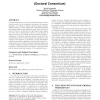Free Online Productivity Tools
i2Speak
i2Symbol
i2OCR
iTex2Img
iWeb2Print
iWeb2Shot
i2Type
iPdf2Split
iPdf2Merge
i2Bopomofo
i2Arabic
i2Style
i2Image
i2PDF
iLatex2Rtf
Sci2ools
99
Voted
ATAL
2015
Springer
2015
Springer
One-Sided Matching with Dynamic Preferences
One-sided matching is concerned with the allocation of indivisible objects to a set of agents, in the absence of monetary transfers. In contrast to many real-life scenarios such as shift scheduling or course assignment, traditional matching mechanisms assume that agents precisely know their preferences. However, preferences over alternatives may change over time due to idiosyncratic reasons or as a function of earlier outcomes. My research focuses on the theoretical investigation of dynamic matching markets, along with the experimental study of various matching mechanisms in such dynamic environments. In particular, I design and analyze truthful sequential mechanisms in settings with dynamic ordinal preferences to further elucidate a principled approach to decision making in dynamic models of resource allocation and fill the current gap between stochastic reasoning models and the game-theoretical elements of the matching theory. Categories and Subject Descriptors I.2.11 [Distributed ...
Related Content
| Added | 16 Apr 2016 |
| Updated | 16 Apr 2016 |
| Type | Journal |
| Year | 2015 |
| Where | ATAL |
| Authors | Hadi Hosseini |
Comments (0)

